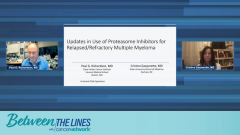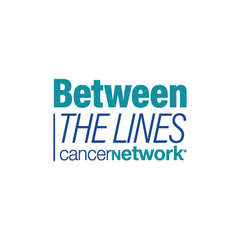
PFS With Ixazomib + Pomalidomide and Dexamethasone in RRMM: Upcoming Trial Data
Experts share their excitement for upcoming PFS trial data to be presented on the combination of ixazomib, pomalidomide, and dexamethasone in multiple myeloma.
Episodes in this series

Transcript:
Paul G. Richardson, MD: I want to show you a particularly interesting set of data that we’ll hear more about at this year’s EHA [European Hematology Association Congress] in Vienna, Austria, from my colleague Peter Voorhees, who’s our principal investigator and a hugely valued member of the Alliance [for Clinical Trials in Oncology] committee. Cristina, you and I—together with other members of the committee—have been part of this effort from Peter. We’ve shown here that ixazomib given weekly [at 4 mg], with 3 weeks on and 1 week off, is clearly established in the phase 1 setting to be an effective platform. We’ve been able to show that the 3 drugs are clearly better than 2, so ixazomib-pomalidomide-dexamethasone does outperform pomalidomide-dexamethasone. What’s been exciting is this ability to generate a tolerability profile that’s particularly favorable. As we close, what are your impressions of your experience with this trial?
Cristina Gasparetto, MD: When we designed the trial, we were thinking about potentially important combinations for our patients. As you mentioned, the antibodies are going strong in the newly diagnosed in the first relapse, but they come with their own baggage and with their own territory. For some patients, they’re not the perfect choice. I’m glad we have an oral combination available that we can use in certain situations, for certain patients, showing that the IMiDs [immunomodulatory imide drugs] and the pomalidomide in combination with ixazomib, the oral proteasome inhibitor, performed quite well. There could be other valuable options in the relapsed/refractory setting for our patients in all oral combinations. I’m pro this 1 as well because we treat a variety of patients and situations, and this is very important information for a subset of patients.
Paul G. Richardson, MD: Thank you very much, Cristina. Thank you for your incredibly valuable insights and time.
Cristina Gasparetto, MD: Me too.
Paul G. Richardson, MD: Thank you. It’s just exciting to see that in the midst of all that we have available from our patients with myeloma, there are some very simple oral regimens that clearly are delivering clinical benefits. Thank you, Cristina. It has been a real pleasure.
Cristina Gasparetto, MD: One doesn’t fit all, so having different options, different combinations, and choosing strategically for our patients as individualized therapy is going to be the key. I’m glad that we have more information about these overall combinations.
Paul G. Richardson, MD: Absolutely, and thank you so much again. Finally, to our audience, thanks for your time and attention during our discussion. We hope some of the points we’ve raised and shared with each other and with you are helpful in your practice and, above all, could be beneficial to your patients. Thank you again.
Transcript edited for clarity.
Newsletter
Stay up to date on recent advances in the multidisciplinary approach to cancer.








































